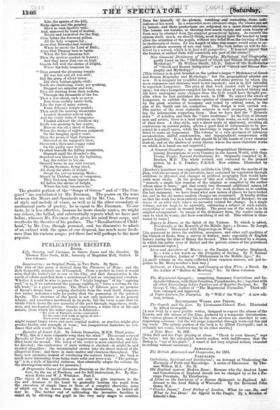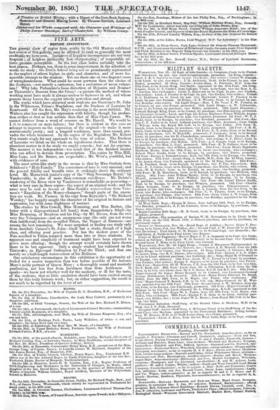PUBIICATIONS RECEIVED:
Bemis.
Life, Scenery, and Customs, in Sierra Leone and the Gambia. By Thomas Eyre Poole, D.D., formerly of Magdalen Hall, Oxford. In two volumes.
Imagination ; an Original Poem, in Two Parts. By Spero. [The idea of this poem is derived from the Pleasures of Hope; and the style frequently reminds one of Campbell. From a preface in verse it would seem that the writer's lot is east in the City, and that Imagination is the result of efforts snatched from ,a monotonous if not an uncongenial vocation. Whether it would be wise to pursue the "bright longings" of his "aspiring soul," so as, if we understand the passage rightly, to "leave a calling for the idle trade?" is a grave question. The Ifours of Idleness gave no promise of Byron s future fame : judging absolutely from the work itself, Imagina- tion rather indicates a taste for poetry than the possession of the poetical faculty. The structure of the poem is not only imitative in its general scheme, and sometimes incoherent in its parts, but the verso wants that via vivida which shows the raw material of the poet through ruggedness, weak- ness, and mechanical defects. Greater experience, a wider view of life and nature, (from which the writer says he is debarred- " Ity view of Natures works contracted To the same dull walk at morn, at eve—
Then mom and eve again,")
might impart larger views and more original matter, as practice might give greater facility and strength of verse; but Imagination furnishes no evi- dence that such would be the case.] Episodes of Insect _Life. By Acheta Domestics,, MRS:. Third series. ["Why, this is a more exquisite-song than the other." The second series of Episodes of Insect Life was. a. great improvement upon the first, and the third beats the second. The fancy of the writer is more controlled and bet- ter directed ; the exuberance of mere writing is checked—it might be said avoided altogether ; the intermingled stories take the direct instead of the allegorical form ; and there is. more matter andeloseness throughout. The fancy now animates instead of overlaying the natural history ; the book is much more interesting from being more solid and more real. "The getting- up" is in a style of fanciful, richness,. that admirably adapts the volume for the drawingroom-table and for presents.] A Progressive Course of Inventive Drawing on the Principles of Pesta- lora, for the use of Teachers, and for Self-Instruction, &c. By Her- mann Kriisi and W. J. Whitaker. Part I.
[The object of this publication. is not only to give exactness to the eye and firmness to the hand by gradually leading the pupil from the execution of simple lines- to • those of a complex character, some of which are to be drawn from the objects themselves, as indeed all may be. The further end of oultivating the inventive faculties is aimed at, by allowing the- pupil in the very early stages to combine - lines for himself, if he pleaisee, watching- and oorrecting cations of his mind. In a somewhat more advancedstage, the classes-meant to invent, and their productions are subjected to, a. mom direct-criticism -The, lessons are various,- as showing holninuch variety, aneyen,beautrof form may be attained from_the simplest geometrical fitures. As regards the, system-itself, much, we should think, must depend nrani-the-teacher to keep alive the attention-of the pupils, without any .relief from the drawing of limo.. in mathematical forms, for the Length. of time this-room would seem to re- quire to attain accuracy of, oye. and hand. The-book befere _us will be fol-
lowed by a second, which is to deal-with perspective. It do etirtbat " the human.or sonmal form will constitute any part of-thi
_New Classical Dictionary of )3iography, bolo partly based on. the "Dictionary of Gret4t- nd'R'Blliaiy a3' Mythology." By William Smith, LED41-EatakifiltlialIk of "Greek and ftenitin Antiquities"' .endLtiPO4-Grablefithl
graph,. and Mythobigy:" , .
[This:volumeis in part founded on the autheesdarger," Diction:aye& Greek and Roman Biography and Mythology," imit the: geographical-Articles are . new. It is designed for youthful students, andether persons by whom the more expensive and elaborate-work is not required ; and is in fact intended to supersede Lempriere. The plan of that work cannot well be improved upon; but since Lempriere compiled his book our ideas of ancient history and life have undergone more changes than the D.D. would have thought pos- sible whene he first published his work, in 1788. To correct the errors or Lerapriere, to exhibit the modern opinion-of classical subjects as-advanced by the great scholars of Germany and tested by critical sense, is. the. aim of Dr. Smith and his- coadjutors, This design is well carried out. The matter of the more elaborate subjects is well arranged, by separat-. lag the information respecting them : thus we have first the " Homeric story" of Achilles, and then the "later, traditions." In the lives of literary men and artists, there is a brief criticism on their works, as well as a notice of their lives. A close style, and-a direct mode of statement, avoiding.all. controvensy on mooted points, allows a good deal of information to be. pre- sented.in a small space, while the knowledge is imparted in the mode best fitted to make an impression. The volume is a, rare specimen.of laborious. accumulation, skilful condensation, and typographical compression with perfect legibility. It is a book that should be in the hands of every claseical student, andon the shelves of every library where the more-elaborate works. on which it is based are not required.] A General Gazetteer; or compendious Geographical Dictionary : cos
taming. Desoriptions.of every Country in..the known World, with their Towns, People, Natural Proclhetions, &c. Originally compiled by IL Brookes, M.D. The whole revised, and corrected to the present period, by. A. G. Findlay, F.R.G.S: New edition, Illustrated by Maps.
[Rrookes's Gazetteer. was originally puldishedin.1762; and the merits-of its plan, with the accuracy of its execution, have sustained its reputation through additions to physical and changes in political geogmphy that would have sunk most works. Iii the preface of- this new edition, it is stated that "-scarcely a single line remains of. the original as compiled by the author whose name it bears," arid that nearly two thousand' additional names (of places) have been added. Our inspection of the war* inclines us to .confirea. the last statement : we have, found what-new names of places we have looked for' and in the old names modern changes are mentioned. It hardly strikes us that the work has been entirely rewritten since-the time of Brookes; we see traces of an elder style where no necessity existed for change. In a single volume not too large to be unwieldy, embraeino. a- subject of such extent, everything of course is treated briefly. The grelt use of the work is in its original arrangement : by means of the dictionary 'firm, the reader turns at once to what he wants, and finds something if not all. This edition is illus- trated by maps.] Popery.in Power, or the Spirit of the Vatican. To which is- added, .Priesteraft, or the Monarch of the Middle Ages - a.Drama. By 'Tose& Turnley. Illustrated with Engravings on Wood.
[An argument to prove the ambition, arrogance, and other evil qualities of the-Church of Rome, from a survey of history, more especially- of English history during the time of Henry the Second. This is followed by a drama, in. which the public vices of Beeket.and the private crimes of the priesthood are prominent topics.]
Lives and Anecdotes of Misers; or the Passion of. Avarice. Displayed, &c.; with a few words on the Frugality of Saving. By F. Bonnier Merryweather, Author of " Bibliomania in the Middle Ages," &c.
[A small volume in the main collected from common sources, not put to- gether. in Mr. Merryweather's best way.]
Bathurst, or Church, State, and Country as they Were; a Novel. By! the Author of "Molten de Mowbmy,' &c. In three volumes, Ti4V.1.32, The Magisterial Synopsis comprising Summary Convictions and In- dictable Offences, with. their Penaties,.Puuishments, &c. ; together with all other Proceedings before Justices out of Quarter-Sessions, &c. By. George C. Oke, Author of "The Magisterial Formulist." Third edi- tion, enlarged and improved. A Paper Lantern for Puseyites. By " Will_o' the_Wisp." A. new edir tion, revised. ILLUSTRATED Woaxs , Awn Prawn.
2:7se Guards and the Line. By Lieutenant-Colonel Hort. Illustrated by Alfred Crowquill.
[A new work by a most prolific writer, designed to expose the abuses of the Guards, and the misuse of the Line, prefaced by a temperate introduction. The various.phases of military. life in the two services are sketched in cor- responding columns: but the wit drags somewhat through worn-out fun and big words. The artistic portion_ of the book is by Alfred CrowquiLl ; and is certainly not comic, whatever may be its other merits.]
A False Hove. By HIL [John Bull and the Pope playing at chess. "Check to your Queen," says,- the latter : but his antagonist merely replies, with indifferenee, that the Bishop is "out of his place." A smart if not very original notion, executed. in etching without caricature.]
ALMANACS.
The British Abnanack and Companion, for 1851.
PAmmums.
Catholioity, Spiritual and Intellectual; an Attempt at Vindicating the Harmony of Faith and Knowledge. A series of Discourses. By Tho- mas Wilson, M.A. No. U.
Old. England against Modern Boise: Reasons why the Ancient Laws, and Constitution of England should not be changed by or for a Eus reign..Potentate. By Eleutherius. 4 Letter on the Intrusion of a Roman _Episcopate in, England. Ad- dressed to the Lord Bishop of Worcester. By the Reverend Jelm, Oates; M.A. "Charles James," Lord Bishop of _London, What he can Do, and' Tnat .he has .D.on 1 An Appeal to the People. By a Member, of Lincoln's Inn., A-Tnatise on British Mining ; with a Digest of the Cost-Book System, Staanarie and General Ifinniir Laws: By Thomas-Bartlett, Lombard. Street.
Ittnius and his Werke compared with the Character and .Writinyr of,. PAW, _Dormer Stanhope, Bart of Chesterfield. By William Cramp.



























 Previous page
Previous page